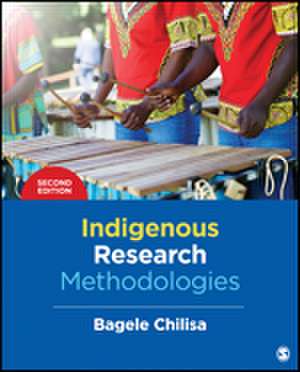Indigenous Research Methodologies
Autor Bagele Chilisaen Limba Engleză Paperback – 28 ian 2020
Chapters cover the history of research methods, ethical conduct, colonial and postcolonial epistemologies, relational epistemologies, emergent and indigenous methodologies, Afrocentric research, feminist research, narrative frameworks, interviewing, and participatory methods.
Additional information on indigenous quantitative research reflects new developments in the field. New activities and web resources offer more depth and new ways for students to extend their knowledge. This textbook includes features such as key points, learning objectives, student exercises, chapter summaries, and suggested readings, making it an ideal textbook for graduate-level courses.
Preț: 395.26 lei
Preț vechi: 506.74 lei
-22% Nou
75.64€ • 78.46$ • 63.07£
Carte disponibilă
Livrare economică 06-20 martie
Livrare express 19-25 februarie pentru 37.39 lei
Specificații
ISBN-10: 1483333477
Pagini: 392
Dimensiuni: 187 x 232 x 25 mm
Greutate: 0.68 kg
Ediția:Second Edition
Editura: SAGE Publications
Colecția Sage Publications, Inc
Locul publicării:Thousand Oaks, United States
Cuprins
Acknowledgments
About the Author
Chapter 1 • Situating Knowledge Systems
Overview
Learning Objectives
Before You Start
Introduction
Terminology in Postcolonial Indigenous Research Methodologies
Decolonization of Western Research Methodologies
Summary
Chapter 2 • Research Paradigms
Overview
Learning Objectives
Before You Start
Contested Knowledge: Indigenous Perspectives or Paradigm?
A Postcolonial Indigenous Research Paradigm
Assumptions About the Nature of Reality, Knowledge, and Values
Methodology
Euro-Western Research Paradigms
Summary
Chapter 3 • Discovery and Recovery: Reading and Conducting Research Responsibly
Overview
Learning Objectives
Before You Start
Introduction
Postcolonial and Indigenous Theories
Researching Back: Methodological Imperialism
Postcolonial Theory and Language
Critical Race Theories
Summary
Chapter 4 • Whose Reality Counts? Research Methods in Question
Overview
Learning Objectives
Before You Start
Colonizer/Colonized Dichotomies and the Ideology of the Other
Dismissing Indigenous Ways of Knowing
Research Ethics and the Legitimacy of Knowledge
Summary
Chapter 5 • Postcolonial Indigenous Research Paradigms
Overview
Learning Objectives
Before You Start
Indigenous Knowledge and Research
Indigenizing Research Methodologies
Postcolonial Indigenous Research Paradigms
Relational Ontology in Context: Perspectives From Africa
Relational Ontology: Perspectives From Scholars in Canada and Australia
Relational Epistemologies
Relational Axiology
Relational Axiology: Perspectives From North America and Canada
Summary
Chapter 6 • Decolonizing Evaluation
Overview
Learning Objectives
Before You Start
Why Evaluation
Evaluation Discourse in a Global Context
Blind Reliance on Eurocentric Tools
The Shift in Evaluation Practice
The Made in Africa Evaluation Perspective: A Paradigmatic Lens
Decolonization Intent
Indigenous Multicultural Validity
Conducting an Indigenous Evaluation
Summary
Chapter 7 • Decolonizing Mixed Methods Research
Overview
Learning Objectives
Before You Start
Toward the Meaning of MMR
Mixed Methods Designs and Rationales
Indigenous Mixed Methods Approaches
Summary
Chapter 8 • Indigenous Mixed Methods in Program Evaluation
Overview
Learning Objectives
Before You Start
The Indigenous Paradigmatic Lens
Embedding the Study in Global Knowledge
Summary
Chapter 9 • Theorizing on Social Science Research Methods: Indigenous Perspectives
Overview
Learning Objectives
Before You Start
Introduction
Methods Based on Ethnophilosophy
Storytelling Methods
In What Language Is the Story Told?
Summary
Chapter 10 • Culturally Responsive Indigenous Research Methodologies
Overview
Learning Objectives
Before You Start
Regional, National, and Local Specific Methodologies
Paradigm, Methodology, and Methods
Validity and Reliability: An Overview
Rigor in Qualitative Research
Credibility
Validity: A Postcolonial Indigenous Framework
Accountability, Respectful Representation, Reciprocity, and Rights and Responsibilities
Kaupapa Maori Research Methodology
Ethical Issues in the Creative Relationship Framework
Cyclical Postcolonial Indigenous Research Methodologies: The Medicine Wheel
Pacific Research Methodologies
The Afrocentric Paradigm
Ethics That Underscore the Importance of Agreement and Consensus, Dialogue, and Particularity
Summary
Chapter 11 • Decolonizing the Interview Method
Overview
Learning Objectives
Before You Start
The Conventional Interview Method: An Overview
Postcolonial Indigenous Interview Methods
Indigenous Focus Group Interviews
Symbols in Postcolonial Indigenous Interview Methods
Conducting a Postcolonial Indigenous Interview
Summary
Chapter 12 • Participatory Research Methods
Overview
Learning Objectives
Before You Start
Action Research: An Overview
Participatory Rural Appraisal
Other Methods
The Participatory Action Research Process
Summary
Chapter 13 • Postcolonial Indigenous Feminist Research Methodologies
Overview
Learning Objectives
Before You Start
Introduction
Postcolonial Indigenous Feminist Theory and Research Methodologies
Western Feminisms
African Feminisms and Black Feminisms
Indigenous Feminist Participatory Methods in Practice
Summary
Chapter 14 • Building Partnerships and Integrating Knowledge Systems
Overview
Learning Objectives
Before You Start
Postcolonial Indigenous and Social Justice Working Relationships
Cross-Cultural Partnership Research and Collaboration Between Academics and Donors
Planning Research From a Postcolonial Indigenous Research Perspective
Summary
References
Index
Notă biografică
Bagele Chilisa holds a Masters of Arts degree in Research Methodology. The degree covers Research Design, Statistics and Measurement from the University of Pittsburgh. She earned her PhD in Policy, Planning and Evaluation, also from the University of Pittsburgh. She is currently an Associate Professor at the University of Botswana. In the past 16 years years, she has taught the following courses to graduate and undergraduate students: Research Methods; Educational Evaluation; Constructing Questionnaires and Conducting Surveys; Project Design and Evaluation; Policy Planning and Evaluation.
She is one of the founding members of the Botswana, Lesotho, Swaziland and Namibia Research Association and served as President of the Botswana Educational Research Association from 2000 to 2002. She is also editor of the Botswana Educational Research Journal, board member of the University of Botswana Centre for Scientific Research and Indigenous Knowledge and Innovations and the University of Botswana Research Ethics Committee.
